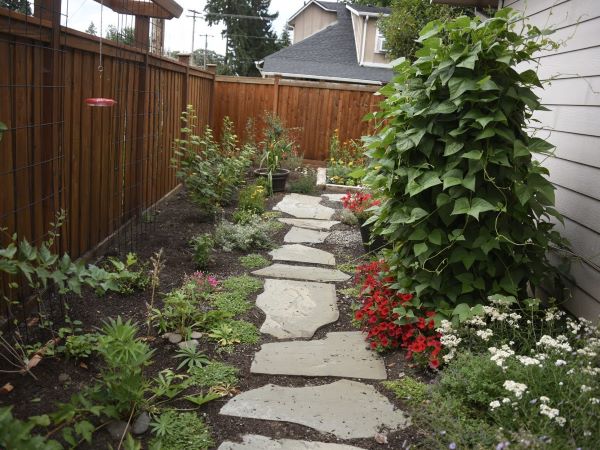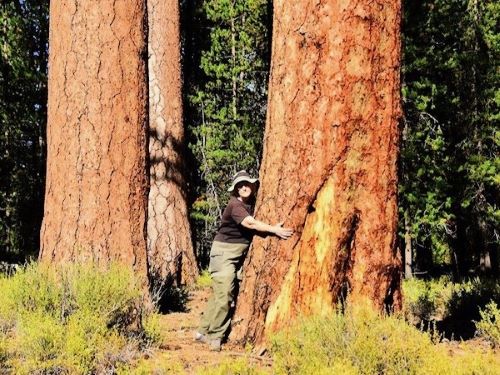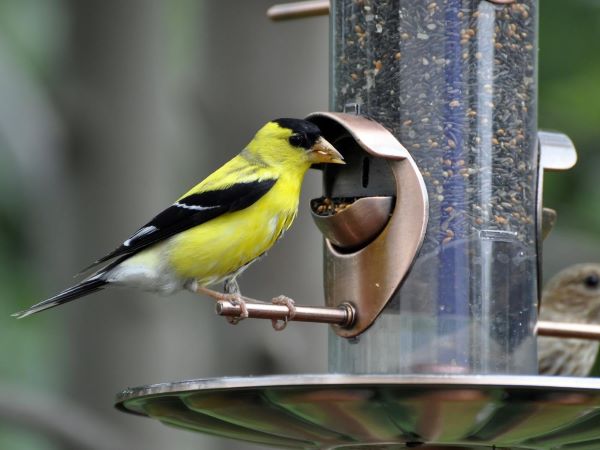Our Habitat Haven volunteers have begun site visits and been enthusiastically received. At the start…
 You might have heard a little something about the birds and the bees. But maybe you haven’t heard that what’s good for bees is good for birds as well. Because that’s true, Lane County Audubon has joined the Eugene Pollinator Protection Committeein collaboration with the Xerces Society, Beyond Toxics, Walama Restoration Project, GloryBee, and the City of Eugene Parks and Open Spaces. By helping to protect native bees, we also secure resources, habitat, and health for our bird populations and other wildlife.
You might have heard a little something about the birds and the bees. But maybe you haven’t heard that what’s good for bees is good for birds as well. Because that’s true, Lane County Audubon has joined the Eugene Pollinator Protection Committeein collaboration with the Xerces Society, Beyond Toxics, Walama Restoration Project, GloryBee, and the City of Eugene Parks and Open Spaces. By helping to protect native bees, we also secure resources, habitat, and health for our bird populations and other wildlife.
Unfortunately, pollinator populations have declined dramatically. A 2017 report revealed that over 700 species of native bees are in trouble. As for the non-native honeybee, beekeepers have lost an average of 38 percent of their hives each winter since 2010. The devastating declines can be attributed to loss of habitat and native plants, widespread use of pesticides, the spread of invasive species and diseases, and climate change. Climate change exacerbates the other threats. Further, climate change can cause a mismatch in timing between when flowers bloom and when native bees emerge in the spring, resulting in bees starving and plants not getting pollinated.
Why should we care? In general, 75-90 percent of flowering plants rely on animal pollinators including insects like bees and butterflies and vertebrates like birds and bats. One out of every three bites of the food we eat is pollinated by bees. Bees pollinate about 75 percent of the most common crop species around the world. Pollinators add about 217 billion dollars to the global economy (over $24 billion in the U.S. alone.). In addition, pollinators are responsible for functional ecosystems that provide food and habitat for other wildlife, clean the water and air, stabilize soils, and provide protection from extreme weather events.
Although most people are familiar with the introduced honeybee, it turns out that there are about 20,000 species of bees worldwide, with 500 species of bees in Oregon alone. That’s not a typo! Five hundred, including species of mason bees, sweat bees, mining bees, carpenter bees, long-horned bees, and cuckoo bees. Most of these bees are solitary; with no hive to protect, they are much less likely to sting than honeybees. Even the social ones, including some bumblebees, are not particularly aggressive and rarely sting. Native bees are more efficient pollinators than honey bees, and a diversity of native bees improves that efficiency. In a recent study published in the journal Science, researchers found that although smaller farms may benefit from five or six different species of bees, large swaths of farmland needed 79 bee species to achieve a 75 percent pollination rate.
Partners on the Pollinator Protection Committee are working together to make Eugene an official “Bee City USA” (see beecityusa.org/) in order to join in the goal of galvanizing communities to sustain pollinators. We believe that the City of Eugene fits the bill for official designation as “Bee-friendly.” The city invests in the creation and restoration of native pollinator habitat. Eugene has banned neonicotinoid pesticides (particularly lethal to bees) from use on city property. Additionally, we have a Native Plant Nursery and neighborhood parks that are pesticide-free. Official designation helps us institutionalize the local government and community’s commitment to pollinator protection and provides accountability. Raising awareness and providing educational materials will help us create and maintain habitat for bees, birds, butterflies, and other wildlife. It will also help improve local food production and support growth of small local businesses that provide pollinator-friendly landscaping and chemical-free garden care, native seed suppliers, and plant nurseries. We hope to engage community volunteers in removing invasive plants and planting native flowers, along with participating in an annual pollinator celebration. Currently, City Councilor Mike Clark (who values bees!) plans to propose that the committee’s resolution be adopted by the City Council in order to receive official designation. Please let your councilors know that you support this endeavor. (To find your city councilor, see eugene-or.gov/532/Find-Your-Ward). Hopefully, by the time you read this, Eugene will be an official Bee-Friendly City. Updates will be available on our web page.
What You Can Do to Be Pollinator-friendly:
- Volunteer to help the city maintain native habitat.
- Support suppliers of pesticide-free native plants. Make sure that the plants you purchase aren’t treated with pesticides.
- Get involved. Raise awareness. Spread the word about the importance of pollinators.
In the Garden:
- Provide diverse and abundant native pollinator plants. Plant various flowering natives that bloom in succession throughout the growing season. For lists of native pollinator plants and bloom times, see salixassociates.com/resources.html
- Provide clean water for drinking, nest-building, cooling, diluting stored honey, and butterfly puddling.
- Provide undisturbed spaces (leaf and brush piles, un-mowed areas, fallen trees and other dead wood) for nesting and overwintering of wild pollinators. Avoid the use of chemicals in the garden. Use pesticide-free materials and plants.



